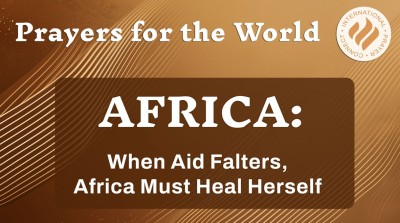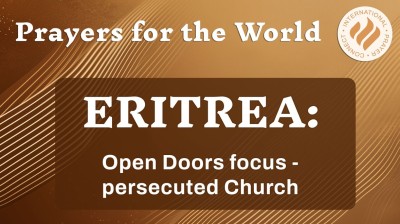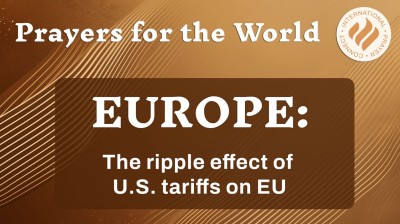Africa at a Crossroads: Strengthening Health Sovereignty in Changing Times
The African proverb “when elephants fight, it is the grass that suffers” echoes with truth in today’s shifting global landscape. Changes in international policies - especially regarding overseas aid - are being felt across the world, and Africa is among the regions most deeply affected.
Recent reductions in humanitarian support from the United States, including funding through USAID and the President’s Emergency Plan for AIDS Relief (PEPFAR), are placing added pressure on public health systems across the continent. For countries like South Africa, which carries nearly a quarter of the world’s HIV burden, PEPFAR has been a crucial partner in the fight against HIV/AIDS for nearly two decades. Thanks to this support, infection and death rates have dropped dramatically. But now, uncertainty around future aid raises concerns about potential gaps in care, access to life-saving medicine, and the stability of prevention programs.
While the impact is real and immediate, this challenge is also prompting courageous conversations. Can Africa continue to rely on funding models vulnerable to change? Or is it time to forge a new path - toward long-term, home-grown solutions?
A growing number of African health experts and leaders believe the time has come to strengthen the continent’s capacity to produce its own medicines. Building a robust pharmaceutical sector would reduce dependence on external donors and offer greater resilience in times of global uncertainty. South Africa, with its strong scientific base and manufacturing capacity, is uniquely positioned to lead this shift and become a catalyst for regional transformation.
This is not about turning away from partnership but about building healthier foundations for collaboration - ones rooted in mutual respect, dignity, and shared responsibility.
Africa’s strength has always been found in its people - in their ingenuity, perseverance, and hope. Now is the time to invest in that strength, and to shape a future where every life matters, and no one is left behind.
Prayer Pointers
- Pray: for protection over vulnerable communities affected by changes in global aid, that God would bring provision and peace.
“He upholds the cause of the oppressed and gives food to the hungry.” Psalm 146:7 - Pray: for African nations to build sustainable, locally-led health systems, anchored in courage and wisdom.
“The Lord will make you the head, not the tail.” Deuteronomy 28:13 - Pray: for righteous and visionary leadership across Africa - leaders who will uphold justice, protect the weak, and act with compassion.
“Rescue the weak and the needy; deliver them from the hand of the wicked.” Psalm 82:4
Prayer – Praying for Africa’s Health Future
Lord, bless the nations of Africa with boldness and wisdom. Raise up leaders with vision, compassion, and faith to build resilient health systems. Protect the most vulnerable, and inspire unity and innovation across the continent. Let Africa rise—healed, empowered, and led by Your Spirit.
More: https://mg.co.za/thought-leader/2025-03-31-us-aid-cuts-africa-must-make-its-own-medicine/
Russia has launched its largest military conscription effort in years, aiming to enlist 160,000 men between 18 and 30—a significant increase from previous years. This move comes amid critical developments in the Ukraine war. Despite ongoing peace discussions with the United States, Russian forces continue to press forward in eastern Ukraine, relying on North Korean soldiers in the Kursk region to counter Kyiv’s advances. Air assaults on Ukrainian cities have also persisted.
In an unexpected diplomatic twist, senior Russian negotiator Kirill Dmitriev is set to visit Washington, DC, to meet with Trump administration official Steve Witkoff. This will be the first high-level Russian visit to the US since the 2022 invasion. It signals a potential shift in US-Russia relations since President Donald Trump’s return to office earlier this year.
However, tension remains as Russian President Vladimir Putin recently dismissed Trump’s call for an immediate ceasefire, demanding the lifting of US sanctions as a condition for halting fighting in the Black Sea. Trump acknowledged that Russia might be deliberately slowing down negotiations, highlighting the ongoing complexity and fragility of the peace efforts.
Prayer Pointers (Watch Sergey Shidlovskiy’s Prayer video HERE)
- Pray: for the safety and protection of innocent civilians caught in the conflict, especially those facing violence and displacement. "The Lord is a refuge for the oppressed, a stronghold in times of trouble." Psalm 9:9
- Pray: for leaders on both sides to seek peace with integrity, prioritizing human life and stability over political gain. "The king’s heart is in the hand of the Lord; he directs it like a watercourse wherever he pleases." Proverbs 21:1
- Pray: for the Church in Russia and Ukraine to be steadfast in faith, offering hope and support amidst the turmoil. "God is our refuge and strength, an ever-present help in trouble." Psalm 46:1
Prayer – Praying for Peace in Ukraine
God of mercy, we pray for peace in Ukraine. Strengthen its people, guide its leaders with wisdom, heal the wounded, and soften the hearts of those causing harm. Bring comfort, hope, and restoration to all. Amen.
More: https://edition.cnn.com/2025/04/02/europe/putin-russia-spring-conscription-ukraine-intl/index.html
Ongoing violence in North and South Kivu in the Democratic Republic of the Congo (DRC) is leaving a trail of death, destruction, and displacement. The sound of gunfire has become all too familiar for families in towns like Masisi Centre, where intense clashes erupted again this week between M23 rebels and local militias.
The toll is rising. At least two civilians were killed, many more injured, and families remain trapped in their homes, paralyzed by fear and unable to access necessities. Fighting has made accurate assessments nearly impossible, but the suffering is undeniable. Amid the chaos, courageous workers and local volunteers are pressing on where they can. In Sake, over 500 displaced households have received emergency hygiene and household supplies, and water points are being repaired—offering a sliver of relief in a sea of hardship.
But relief is hard to come by. In South Kivu’s Fizi Territory, the violence has surged again. Villages already sheltering thousands of displaced people—Mulima and Lusuku—are now emptying once more as new waves of fighting force families to flee. To make matters worse, the southern province of Tanganyika is now facing a rapidly growing cholera outbreak. Nine out of eleven health zones are affected. Over 1,450 people have been infected this year and 27 have died—a six-fold increase from the same period last year. With clean water nearly non-existent in many communities and health centres struggling to keep up, the crisis is intensifying.
The M23, claiming to defend the interests of Congolese Tutsis, has advanced with alarming speed—reportedly with the support of Rwandan forces. Other groups like the Allied Democratic Forces (ADF) also remain active, fuelling instability that local communities have endured for far too long.
The people of eastern Congo are weary. Displaced from homes, cut off from clean water, and gripped by fear, they are facing one of the region’s darkest seasons in recent memory. For many, it feels as though the world has looked away. But their voices rise. And so must ours—in prayer, in advocacy, and in hope that justice and peace will one day take root where violence has reigned for too long.
Prayer Pointers
- Pray: for protection, provision, and peace for civilians caught in crossfire and forced to flee their homes. “The Lord is a refuge for the oppressed, a stronghold in times of trouble.” - Psalm 9:9
- Pray: for an end to armed conflict and for justice to restrain those who exploit violence to maintain power. “When justice is done, it brings joy to the righteous but terror to evildoers.” Proverbs 21:15
- Pray: for healing, clean water, and resources to contain the cholera outbreak and strengthen overwhelmed health workers. “I will bring health and healing to it; I will heal my people and let them enjoy abundant peace.” Jeremiah 33:6
Prayer – Praying for the weary people of Congo
Lord, have mercy on the people of Congo. Shelter the displaced, heal the wounded, stop the violence, and purge disease. Raise up justice, restore families, and stir the global Church to act with compassion, boldness, and enduring faith. Amen
In the Shadows of the Israel - Gaza War: Lives Lost, Hope Fading
A fresh wave of airstrikes has left Gaza reeling, with the latest blow landing on a shelter in Jabalia — a former UN clinic now crowded with hundreds of displaced people seeking refuge. Nineteen lives were lost, including nine children. Among them, heartbreakingly, a two-week-old baby.
The building had already been damaged earlier in the war, yet more than 700 people were still sheltering there. “They had nowhere else to go,” said Philippe Lazzarini of UNRWA, echoing the desperation of thousands who are simply trying to survive. Across Gaza, families are mourning. Entire homes have been flattened in Khan Younis, Rafah, and Gaza City. First responders report pulling the bodies of women, infants, and elderly from rubble. With aid blockaded and medical centres overwhelmed, each new strike brings another layer of grief — another reminder of the growing humanitarian abyss.
Israel’s Prime Minister Benjamin Netanyahu announced a new military corridor, saying operations had “switched gears.” This strategy, described as increasing pressure on Hamas by seizing territory and dividing the Gaza Strip, aims to force the release of 59 remaining hostages. But for civilians, it has meant intensified bombardment, more displacement, and the erosion of any semblance of safety.
More than 140,000 people have been ordered to evacuate Rafah in recent days — a place many had already fled to, only to be uprooted again. Behind every policy shift, behind each new military objective, are families. Children who no longer sleep. Mothers clinging to memories. A population shrinking under the weight of war.
Even in the heart of sorrow, voices are rising — some calling for ceasefires, others for humanitarian corridors, and all for life over politics. As the Hostages and Missing Families Forum urged, “There is an obligation to pursue every possible channel for the release of hostages.” But there is also an obligation — moral, ancient, unshakable — to preserve the dignity and life of all human beings caught in this terrible storm.
Prayer Pointers
- Pray: for Protection of the Innocent. Ask God to shield civilians—especially children and the displaced—from violence and fear. Pray that homes, hospitals, and shelters would be spared and preserved. “Deliver me, O Lord, from evil men; preserve me from violent men." Psalm 140:1
- Pray: for Just and Compassionate Leadership
Intercede for leaders on all sides to reject political gain and prioritize peace. Pray for wise, humble decisions that honour human dignity. "Give justice to the weak and the fatherless; maintain the right of the afflicted and the destitute." Psalm 82
- Pray: for Peace and Hostage Release
Pray for the swift and safe release of hostages. Ask the Lord to move hearts toward negotiation and ceasefire, breaking cycles of revenge. "He has sent me to bind up the broken-hearted, to proclaim liberty to the captives…" Isaiah 61:1
Prayer – Praying for human life amidst the war
Lord, we cry out for the people of Gaza and Israel. Still the hands of violence. Shelter the innocent. Stir courage in leaders to seek peace, not power. Restore justice and dignity where it has been trampled. May mercy prevail over vengeance. Amen.
Open Doors focus - Under Watchful Eyes: Eritrea’s Silent Church Stands Strong ‘Faith that whispers yet refuses to break’
In Eritrea, faith must be practiced in hushed tones. The government recognizes only four religious groups: the Eritrean Orthodox Church, Catholicism, Lutheranism, and Islam. Any believer who dares to step beyond these lines — particularly those who embrace Protestant Christianity — is seen not as a seeker of truth, but as a threat.
House-to-house raids are common. Worship behind closed doors can mean arrest. Detention without trial. Years in shipping containers, exposed to searing heat and freezing nights. And still, they gather.
Christians like Paulos live under the constant shadow of surveillance. “We live in fear of who will be arrested next,” he says quietly. “Will it be another brother in Christ? Will it be me?” Yet even as fear stalks their steps, they walk on. “We must continue to walk with God.”
For many Eritrean believers, persecution isn’t a headline — it’s daily bread. Phones tapped. Internet watched. Church buildings closed or bulldozed. Pastors vanished. The government’s grip is tight, and its silence loud. Eritrea has been called the North Korea of Africa — and for good reason. Military conscription lasts indefinitely, and Christians are among the first to be punished for their convictions. Refusing to take up arms, many believers are sentenced to years of hard labour with no end in sight.
Yet the underground Church survives. Not because the pressure eases, but because the gospel compels them to endure. Faith flourishes in prisons and secret gatherings, in whispered hymns and memorized Scriptures.
Eritrea’s persecuted Church doesn’t ask for sympathy. It asks for prayer.
Prayer Pointers:
- Pray: for courage and endurance for Eritrean believers meeting in secret — that they may be strengthened in the face of fear. “Be strong and courageous. Do not be afraid or terrified because of them, for the Lord your God goes with you…” Deuteronomy 31:6
- Pray: Lift up imprisoned Christians, especially pastors and those held without trial — that God would protect them, encourage them, and bring miraculous release. "The Lord hears the needy and does not despise his captive people.” Psalm 69:33
- Pray: Ask for transformation within Eritrea’s government — that hearts would soften, religious freedom would be recognized, and justice would rise like the dawn. “He has sent me to proclaim freedom for the prisoners and recovery of sight for the blind, to set the oppressed free.” Luke 4:18
Prayer for Eritrea
Lord, we pray for Eritrea — for courage among believers, freedom for the imprisoned, and comfort for those suffering in silence. Let Your Church endure with hope, and may truth break through fear like morning light. In Jesus’ name, Amen.
More: https://www.opendoors.org.za/christian-persecution/world-watch-list/eritrea/
As the U.S. imposes 20% tariffs on European goods, the immediate impact in Europe could be a reduction in prices, but at what cost? While lower prices on certain products like Italian wine may boost purchasing power in the short term, the broader economic consequences could be severe.
How the Tariffs Affect the Market: One of the primary reasons prices could drop in Europe is an increase in supply. As the U.S. raises its tariffs, products initially destined for American consumers, such as Italian wine, may stay within the European market, creating oversupply. Simultaneously, products from China are redirected to Europe, further contributing to an increase in supply. While this may seem like a boon for consumers, experts warn that it could lead to deflation—a dangerous economic scenario.
The Danger of Deflation: Deflation, a drop in the overall price level of goods and services, may seem good in the short term as it encourages consumers to spend, but it has far-reaching negative effects. As consumers wait for prices to fall even further, demand slows, leading to decreased production, which in turn causes wages to stagnate or even fall. This sets off a dangerous cycle of rising unemployment, ultimately hurting the broader economy.
Uncertainty and the Long-Term Consequences: Tobias Gehrke, a researcher at the European Council on Foreign Relations, emphasizes that the greatest threat posed by these tariffs is uncertainty. With all European exports now facing increased duties, companies in Europe—especially those reliant on exporting goods like machinery, chemicals, and cars—could experience significant losses. If this uncertainty persists, companies may hold back investments, which could harm employment and future economic growth in the region.
China's Role and the EU's Response: The economic implications hinge heavily on how China and the EU respond. If China retaliates, or if the EU can negotiate its way around these tariffs, the situation could shift. The U.S. may also leverage these tariffs as bargaining chips in larger negotiations, further complicating the landscape.
While it remains unclear what long-term effects these tariffs will have on Europe, the situation calls for caution. Economic stability is key, and much will depend on how the various players in this complex trade web react.
Prayer Pointers: Pray for Europe Amidst Trade Uncertainty
- Pray: for Economic Stability: Pray for wisdom and discernment for European leaders as they navigate the uncertainty caused by tariffs, seeking solutions that protect the livelihoods of their people and promote long-term economic stability. “Plans fail for lack of counsel, but with many advisers they succeed.” Proverbs 15:22
- Pray: for Global Cooperation: Pray for unity among global powers, asking God to foster dialogue and cooperation that can lead to peaceful, mutually beneficial agreements, and to soften hearts towards fair trade practices. “If it is possible, as far as it depends on you, live at peace with everyone.” Romans 12:18
- Pray: for the Well-being of the People: Pray for the ordinary people of Europe who are affected by economic challenges, that God would provide for their needs, bring relief, and protect them from the negative effects of rising unemployment and instability. So do not fear, for I am with you; do not be dismayed, for I am your God. I will strengthen you and help you; I will uphold you with my righteous right hand.” Isaiah 41:10
Prayer:
Lord, we lift Europe in this time of economic uncertainty. Grant wisdom to leaders, protection for the people, and guidance in international relations. May Your peace reign, bringing stability, cooperation, and provision to all who are affected. Amen.
More: https://www.euronews.com/my-europe/2025/04/04/what-impact-will-new-us-tariffs-have-on-the-wallets-of-people-in-europe






